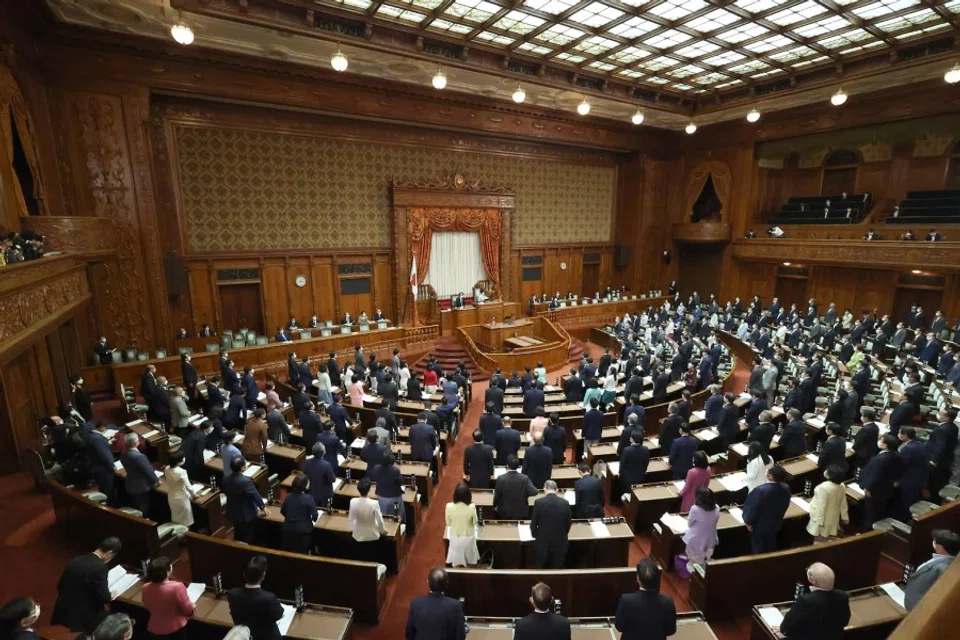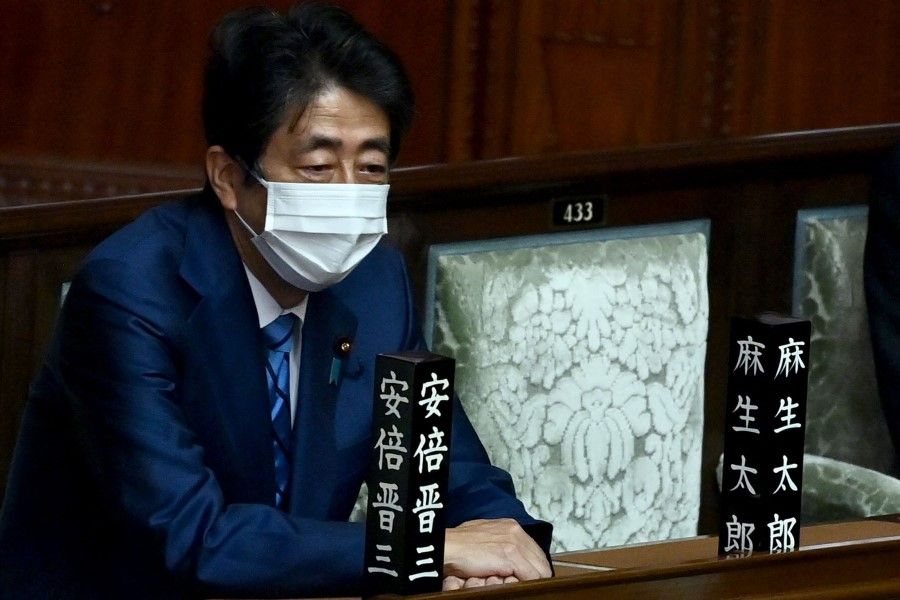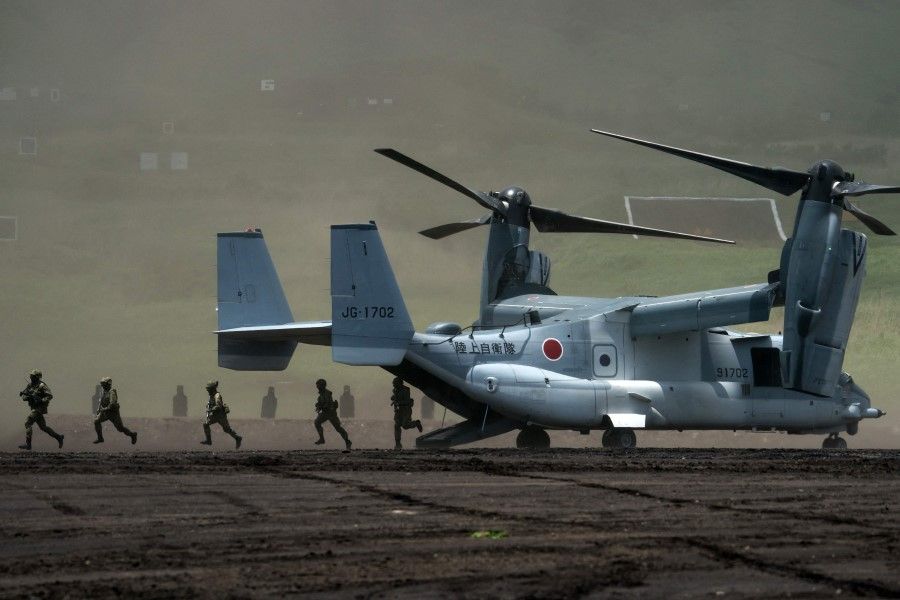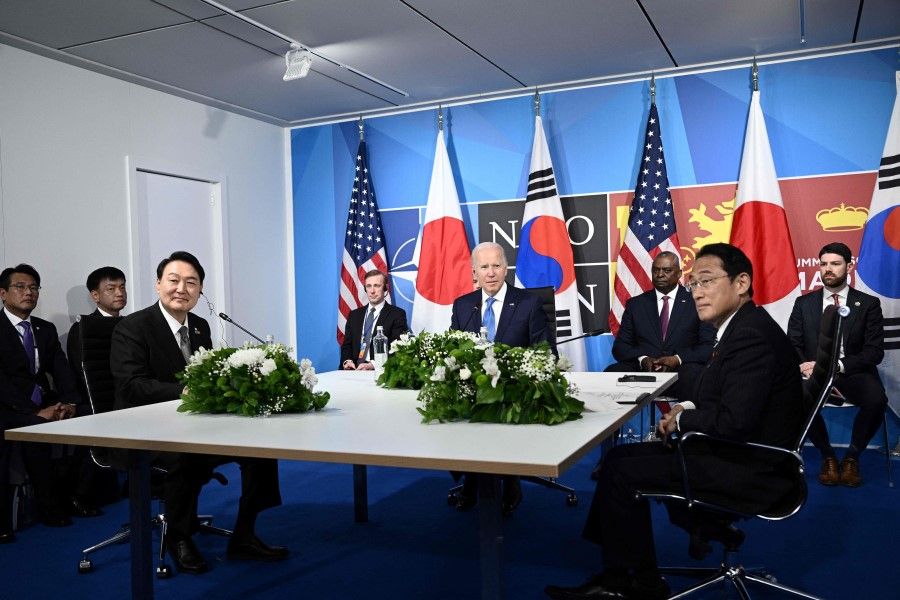Constitutional revision is not entirely Japan's domestic affairs

The demise of former Japanese Prime Minister Shinzo Abe has paved the way for amending Japan's constitution. During the Japanese upper house election held after his passing, the pro-constitutional amendment parties captured more than two-thirds of the seats, exceeding the majority needed to initiate the constitutional amendment process.
Japanese Prime Minister Fumio Kishida announced that Japan's National Diet would discuss the four constitutional amendments proposed by the Liberal Democratic Party (LDP) as soon as possible, so as to clearly define the remit of the Japan Self-Defense Forces (JSDF).
Breaking free
After the Second World War, Japan has been shackled by Article 9 of the pacifist constitution, which states that "land, sea, and air forces, as well as other war potential, will never be maintained. The right of belligerency of the state will not be recognized."
To right-wingers such as Abe, this restriction is no different from disarmament and has caused Japan to be less than a normal nation, rendering it unable to adjust its security strategy according to external changes. They regard the pacifist constitution as the scourge that they must make every effort to break free from.

Abe first expanded the role and power of the JSDF through the Cabinet's re-interpretation of the constitution and the Diet enacting new laws. The new security laws enacted in 2016 allow Japan to exercise the right to collective self-defence and to deploy troops overseas, removing the constraints of the pacifist constitution.
However, some argued that Abe's actions were unconstitutional, and as the change was not a total breakthrough, the pro-constitutional amendment forces continued to advocate revising the constitution.
Even if Japan eventually succeeds in amending the constitution, the scope would be reduced and Japan's foreign relations would be damaged if it insists on making the revisions behind closed doors and ignoring the opinions of the nations concerned.
External obstacles
Although there are several among the Japanese public who think that amending the constitution is neither necessary nor urgent, they are no longer a major obstacle. And while the views of the various political parties remain divided, the collective push against the pacifist constitution is inevitable.
Currently, the main obstacles to constitutional amendment are external. The questions remain, whether the US would be happy to see the amendment efforts succeed, and whether China and South Korea will strongly oppose it.
Even if Japan eventually succeeds in amending the constitution, the scope would be reduced and Japan's foreign relations would be damaged if it insists on making the revisions behind closed doors and ignoring the opinions of the nations concerned.
Japan's eagerness to amend the constitution is understandable. After all, the fanatical militarism of nearly a century ago has receded and the current environment in Northeast Asia is completely different. China's rise has meant that its strength and military might have surpassed Japan's. In fact, it is Japan that now feels threatened by its nuclear-armed neighbours China, Russia and North Korea.
Since amending Article 9 will strategically affect East Asia and the nations concerned will not sit idly by, it is by no means entirely Japan's domestic affairs.

However, by including the JSDF in the constitution, Japan would be signalling to its neighbours and Asia that it is rising from its post-war history and rejecting its pacifist constitution. It would also accelerate the US's Indo-Pacific strategy and even aid in introducing NATO forces to the region.
Since amending Article 9 will strategically affect East Asia and the nations concerned will not sit idly by, it is by no means entirely Japan's domestic affairs.
Sentiments from war victims
Moreover, it is not just an issue of the current reality but also tugs at historical sentiments. Despite Japan's various iterations of words and actions to apologise for the war, the casualties of its militarism feel that Japan's apologies are insincere and its introspection superficial. How could Japan earn the trust and support of its neighbours when it remains committed to its military and efforts to remove the limitations to its military deployment?
This has instead become a cause for discord. Public opinion in China and South Korea generally regards Japan's constitutional amendment as taking a huge step backwards and aggravating the situation.
China, a bitter victim of the Second World War and now the target of the US's Indo-Pacific strategy and NATO expansion, cannot agree with Japan's constitutional amendment to rearm.
If Japan succeeds in amending the pacifist constitution, it will lend legitimacy to the JSDF and upgrade it to a national defence force that Japan can externally deploy without restraint.
Evidently, China, a bitter victim of the Second World War and now the target of the US's Indo-Pacific strategy and NATO expansion, cannot agree with Japan's constitutional amendment to rearm.

Wang Wenbin, China's foreign ministry spokesperson, tacitly said that due to historical reasons, the international community and Japan's Asian neighbours are paying close attention to the issue, and hoped that "Japan will earnestly learn the lessons of history, stay committed to the path of peaceful development, and earn the trust of its Asian neighbours and the international community with concrete actions".
However, once the constitutional amendment process is initiated, China will not be as gentle in its objection, and its countermeasures will be strong, drastic and inevitable.
China believes that Japan's pro-US stance and opposition of China have become increasingly audacious. Instead of acting as a mere pawn or agent of the US in the suppression of China, Japan appears to vigorously lead the charge and actively support the US's strategy of creating an Indo-Pacific version of NATO, or having greater Indo-Pacific nations' participation in NATO.
As these actions would further aggravate its security threats, how can China do nothing while Japan rearms itself?
... there is no guarantee that Japan would not break free of US control and manipulation after it sufficiently rearms itself.
Clash with the US's strategy
Although the US currently regards China as its biggest threat, suppressing China may be beyond its declining might. Hence, it welcomes Japan, its attendant in tow, to lift its restrictions and lend robust assistance in attack and defence.
However, the US-Japan alliance has essentially and interminably sealed Japan's destiny as a defeated nation of the Second World War. As the complete "normalisation" of Japan's security comes at a time when the US is stepping up the formulation of its Indo-Pacific strategy, would Japan's constitutional amendment and military expansion clash with the US's intended dominance of the Indo-Pacific region?
NATO is a case in point. French President Macron is unwilling to have the US completely dominate NATO, so he advocates the establishment of a "European army", which is clearly to seize dominance. Likewise, there is no guarantee that Japan would not break free of US control and manipulation after it sufficiently rearms itself.
Japan's constitutional amendment is bound to thwart the efforts in recent years to gradually shape the US-Japan-South Korea cooperation.

Furthermore, the US is trying every means to involve South Korea, an indispensable ally, in its Indo-Pacific Strategy. As South Korea's deep-seated animosity towards Japan is far from being assuaged, it will vehemently object to Japan's constitutional amendment.
South Korea's disgust at Japan's constitutional amendment goes beyond the advice offered by its foreign ministry spokesperson to Japan to "abide by the pacificist constitution".
Japan's constitutional amendment is bound to thwart the efforts in recent years to gradually shape the US-Japan-South Korea cooperation. How can Washington withstand the damage to the trilateral relation caused by a confrontation between its two allies?
Japan's constitutional amendment concerns the foremost interests of the US, China, South Korea and other nations. Objection by these nations will put a huge dent in its scope and success.
In view of this, in addition to internal consultation, the Japanese government needs to make a diligent diplomatic effort to consult and heed the views of the nations concerned, as well as secure their understanding and support. Japan must never act unilaterally; otherwise, the subsequent developments may be unpredictable and unmanageable.
Related: The real reason why Japan is following the US's lead | US academic: Is Japan a true and loyal US ally? | Chinese academic: Japan is the 'hidden warrior' behind China-US competition | Are Chinese fears of a rise in Japanese militarism post-Abe valid? | What removing the defence budget cap means for Japan's role in the Indo-Pacific | Foreign and security policy in Japan's upper house elections | How Japan's political stance is becoming increasingly hawkish and conservative
